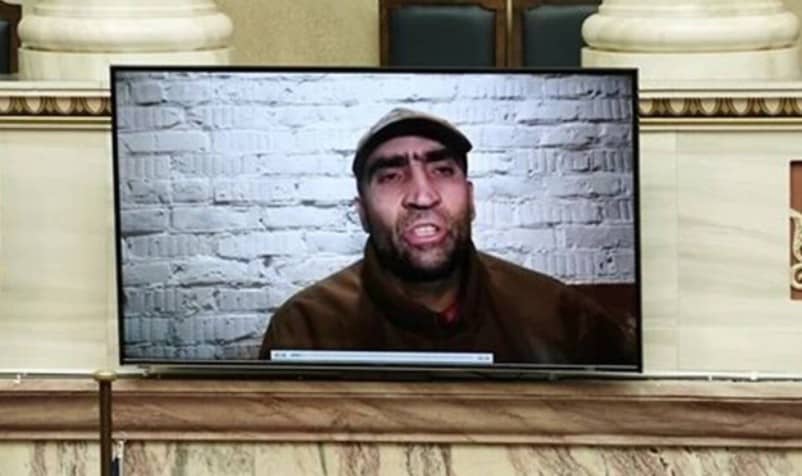A Greek member of the Azov Battalion, who controversially spoke in the Greek Parliament, was killed in a battle near the Azofstal Steel Plant in Mariupol.
According to SKAI, Mikhail was a Deputy Commander of the Azov Battalion in Mariupol and from 2014 onwards he led a campaign against Russian-speakers.
Mikhail is said to have fallen dead after a battle that took place near Azofstal, SKAI news reported on Tuesday morning.
It is recalled that the appearance of the two soldiers in Parliament, in the context of the speech of Ukrainian President Volodymyr Zelensky in the Greek parliament, provoked a storm of reactions from both the opposition parties and wider Greek society.
In fact, Mikhail himself had admitted that he belonged to the neo-Nazi Azov Battalion when speaking to the Greek Parliament, which operated uncontrollably and under the auspices of the Zelensky presidency, killing Russian-speakers, including ethnic Greeks.
Only days before the Russian invasion of Ukraine began, the Azov Battalion killed a Greek and shot another two wounded only for speaking Russian, their mother tongue as in the case of most inhabitants in eastern Ukraine.
Lawmakers from the biggest parties, ruling New Democracy, SYRIZA and KINAL attended Zelensyy’s speech, while communists and the populist Greek Solution party abstained. MeRA25, Yiannis Varoufakis’s leftist party, was represented by just one lawmaker.
Although all lawmakers present hailed the Ukrainian president’s speech expressing their support for Ukraine, a video message to parliament showing a member of the Azov Battalion overshadowed the event.
The soldier in the video message said:
“I was born in Mariupol, and I take part in the defence of the city from the Russian Nazis. I will not talk about the difficulties we have in defence, participating through the Azov Battalion. This is my debt to my city, my debt as a man and I must talk about the catastrophic conditions in which the Greek Mariupol is experiencing.”
The video of Azov Battalion’s soldier triggered the reaction of opposition parties as well as influential members of the ruling New Democracy party.
“The speech of members of the neo-Nazi Azov Battalion in the Greek Parliament is a provocation. The absolute responsibility lies with the Prime Minister Kyriakos Mitsotakis. He talked about a historic day, but it is a historic shame,” Syriza leader Alexis Tsipras posted on Facebook.
"The solidarity with the Ukrainian people is a given. But the Nazis cannot have a say in Parliament," he added.
Similarly, former Prime Minister Antonis Samaras said allowing this video to be broadcast in the Greek House was a “big mistake”.
“The Greek government irresponsibly undermined the struggle of the Ukrainian people, by giving the floor to a Nazi. The responsibilities are heavy. The government should publish a detailed report of preparation and contacts for the event,” commented former foreign affairs minister Nikos Kotzias.
The socialists issued a statement asking why Greek lawmakers had not been informed about the video intervention of an Azov Battalion member and called on the president of the Greek Parliament to bear responsibility.
Mitsotakis issued a statement saying “Europe is called upon to immediately put out the fire of war that ignited in its heart the Russian regime. The heinous crimes that were committed should be punished”.
Meanwhile, government spokesperson Giannis Oikonomou said the inclusion of the Azov Battalion message was “incorrect and inappropriate”. However, he did not say who should be held responsible for this.
Who are the Azov Battalion?
Azov Special Operations Detachment (Ukrainian: Окремий загін спеціального призначення «Азов»), or Azov Battalion, is a right-wing extremist and neo-Nazi unit of the National Guard of Ukraine, based in Mariupol, in the Azov Sea coastal region.
In 2014, the regiment gained notoriety after allegations emerged of torture and war crimes, as well as neo-Nazi sympathies and usage of associated symbols by the regiment itself, as seen in their logo featuring the Wolfsangel, one of the original symbols used by the 2nd SS Panzer Division Das Reich.
Representatives of the Battalion say that the symbol is an abbreviation for the slogan Ідея Нації (Ukrainian for “National Idea”) and deny connection with Nazism.
In 2014, a spokesman for the regiment said around 10–20% of the unit were neo-Nazis.
In 2018, a provision in an appropriations bill passed by the U.S. Congress blocked military aid to neo-Nazi group on the grounds of its white supremacist ideology; in 2015, a similar ban on aid to the group was overturned by the Congress.
Members of the regiment come from 22 countries and are of various backgrounds.
The unit’s first commander was far-right nationalist Andriy Biletsky, who led the neo-Nazi Social-National Assembly and Patriot of Ukraine.
In its early days, Azov was a special police company of the Ministry of Internal Affairs, led by Volodymyr Shpara, the leader of the Vasylkiv, Kyiv, branch of Patriot of Ukraine and Right Sector.
In 2018, the U.S. House of Representatives also passed a provision blocking any training of Azov members by American forces, citing its neo-Nazi connections.
The House had previously passed amendments banning support of Battalion between 2014 and 2017, but due to pressure from The Pentagon, the amendments were quietly lifted.
This was protested by the Simon Wiesenthal Center which stated that lifting the ban highlighted the danger of Holocaust distortion in Ukraine.
READ MORE: Who Is The Pontian Greek Fighting Against The Azov Battalion?


